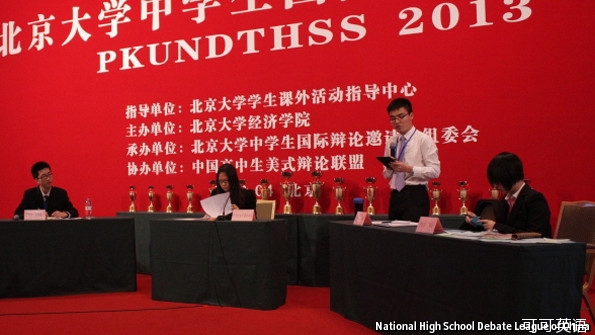(单词翻译:单击)
Debating
辩论
This house believes
本方认为
Some schools are teaching children how to think for themselves
有些学校正在教孩子们如何独立思考
Sep 14th 2013 | SHANGHAI |From the print edition

IN CHINESE classrooms, students rarely question teachers—part of a broader deference to authority in Chinese society. So the growth of Western-style debating in schools and universities, in which participants sometimes argue against prevailing Communist Party policies, can seem incongruous. But interest in such debates is growing.
在中国的课堂上,学生们很少质疑教师,这是中国社会尊重权利更广泛的体现。因此,学校和大学里西式辩论的增多,有时会反对共产党出台的政策,显得很不协调。但是对于此种辩论的兴趣越来越高。
Many schools, especially in the big cities, have teams that debate, in English and Chinese. Educators say the aim is to develop some of the skills they know are lacking: critical thinking, spontaneity and public speaking. Many students also believe taking part in debating as an extra-curricular activity can help with applications to universities in the West.
许多学校,尤其是大城市里,有中英文辩论团队。教育工作者说目的在于开发他们已知的中国学生所缺乏的技能,批判性思维,自发性和公开演讲能力。许多学生也相信在课余时间参与辩论活动对他们申请西方大学有帮助。
Chinese universities have debating teams but there are more political sensitivities at higher levels of education so the debates tend to be less wide-ranging, says Gavin Newton-Tanzer, an American who founded the National High School Debate League of China. Last year more than 200 schools took part in the group’s tournaments. Top debaters from the organisation have been invited to compete at Harvard and Stanford universities in America.
创办中国高中辩论联盟的美国人Gavin Newton-Tanzer表示,中国大学有辩论队,但是在更高等的教育中有更多的政治敏感性,因此辩论范围稍小。去年超过200所学校参与了辩论联盟的比赛。顶级辩手已经被邀请去参加美国哈佛和斯坦福大学的比赛。
The debates are chosen carefully. “We are culturally sensitive,” says Mr Newton-Tanzer euphemistically. A motion deemed too political might be rejected, and the students themselves have strong views. At a tournament in the central city of Wuhan, students refused to debate whether China should forgive Japan for its wartime atrocities, insisting that they could never forgive Japan.
论题是仔细挑选的。Newton-Tanzer委婉的说,我们对文化很敏感。政治性太强的辩题可能被拒绝,学生们观点也很明确。在中部城市武汉的一次比赛中,学生们拒绝辩论中国是否应该原谅日本战时的暴行,坚持表示他们永远不会原谅日本。
Gao Wenbing is a member of a school debating team in the coastal city of Qingdao. He says he knows there are certain “red lines” he can never cross, such as mentioning some sensitive issues. “But basically,” he says in flawless English, “I feel quite free.”
高文冰是海滨城市青岛的一名学校辩论队成员。他说他知道有他无法逾越的红线,比如说提及一些敏感话题。但是基本上我觉得很自由,他用流利的英语说到。
At one competition at Peking University, in which Mr Gao took part in May, students debated whether China’s rise is good for America or not. The debate went back and forth, with one participant, speaking for America, concluding: “we are the lighthouse of…liberty and democracy. Why do you think this ideology can’t prevail over the Chinese version of communist ideology?”
小高五月在北京大学参加的一次比赛中,学生们辩论中国的崛起对美国是利还是弊?辩论来来回回,有一个参与者为美国说话,总结到,我们是自由和民主的灯塔。为什么你们觉得这个思想无法战胜共产主义意识形态的中国版呢?


